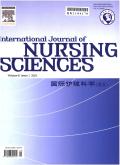脑卒中患者的预先护理计划:一项范围综述
IF 3.1
3区 医学
Q1 NURSING
引用次数: 0
摘要
目的探讨脑卒中患者提前护理计划(ACP)的实施情况。方法根据Arksey和O 'Malley框架进行范围综述。因此,我们搜索了在ScienceDirect、PubMed、Scopus、ProQuest和Medline上发表的文章。纳入标准为成人或老年脑卒中患者ACP的原始研究、医院或社区研究以及以英语或印尼语发表的研究。然后使用定性分析来确定关键词、类别和主题。结果在1050篇文献中,只有8篇符合纳入标准,表明ACP干预脑卒中患者的研究有限。最终确定了四个主题:非加太战略的实施、非加太实施的挑战、非加太的好处以及影响非加太的因素。ACP策略的实施包括ACP方法、沟通方式、参与角色、使用的媒体和ACP文件。缺乏ACP的相关信息、设施、丧失行为能力的患者以及不愿实施ACP已成为中风患者实施ACP的挑战。ACP的好处,特别是ACP项目的结果,包括对ACP参与的认识,患者可以表达他们的愿望,以及增加预先指示(AD)文件。影响ACP的因素包括患者的病情、知识和合适的ACP方法。结论acp尚未广泛应用于脑卒中患者的干预。由于脑卒中患者的病情不同,ACP的实施充满了挑战。需要有效的策略来改善脑卒中患者的ACP。有必要开发一种跨专业合作的脑卒中患者ACP方法,对脑卒中患者ACP的研究需要通过跨专业合作进一步开展。本文章由计算机程序翻译,如有差异,请以英文原文为准。
Advance care planning among stroke patients: A scoping review
Objective
This study aimed to describe the implementation of advance care planning (ACP) in patients with stroke.
Methods
A scoping review was conducted according to the Arksey and O’Malley framework. Accordingly, we searched for articles published in ScienceDirect, PubMed, Scopus, ProQuest, and Medline. The inclusion criteria were original research on ACP among adult or elderly stroke patients, hospital- or community-based studies, and those published in English or Indonesian. Qualitative analysis was then used to identify keywords, categories, and themes.
Results
Among the 1,050 articles identified, only 8 satisfied the inclusion criteria, indicating that limited studies were available for ACP interventions among stroke patients. Four themes were ultimately identified: the strategy implementation of ACP, the challenges of ACP implementation, the benefits of ACP, and the factors influencing ACP. Strategy ACP implementation included the ACP method, the communication style, participation role, media used, and ACP documentation. Lack of information about ACP, facilities, incapacitated patients, and reluctance to implement have become challenges to implementation in stroke. The benefits of ACP, particularly the outcomes of the ACP program, included awareness of ACP engagement, patients can express their wishes, and increased advance directive (AD) documentation. The factors influencing ACP included patient condition, knowledge, and appropriate ACP methods.
Conclusion
ACP has not been widely used when providing interventions for stroke patients. The implementation of ACP in stroke patients is full of challenges due to various patient conditions. Effective strategies are needed to improve ACP in stroke patients. It is necessary to develop an ACP for stroke patients’ method that involves interprofessional collaboration, and studies on ACP in stroke patients need to be further conducted through interprofessional collaboration.
求助全文
通过发布文献求助,成功后即可免费获取论文全文。
去求助
来源期刊

International Journal of Nursing Sciences
Nursing-Nursing (all)
CiteScore
6.10
自引率
2.60%
发文量
408
审稿时长
25 days
期刊介绍:
This journal aims to promote excellence in nursing and health care through the dissemination of the latest, evidence-based, peer-reviewed clinical information and original research, providing an international platform for exchanging knowledge, research findings and nursing practice experience. This journal covers a wide range of nursing topics such as advanced nursing practice, bio-psychosocial issues related to health, cultural perspectives, lifestyle change as a component of health promotion, chronic disease, including end-of-life care, family care giving. IJNSS publishes four issues per year in Jan/Apr/Jul/Oct. IJNSS intended readership includes practicing nurses in all spheres and at all levels who are committed to advancing practice and professional development on the basis of new knowledge and evidence; managers and senior members of the nursing; nurse educators and nursing students etc. IJNSS seeks to enrich insight into clinical need and the implications for nursing intervention and models of service delivery. Contributions are welcomed from other health professions on issues that have a direct impact on nursing practice.
 求助内容:
求助内容: 应助结果提醒方式:
应助结果提醒方式:


